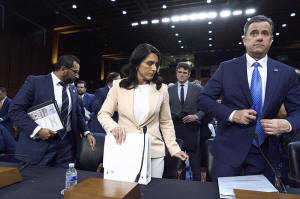Trump downplays national security team texting military operation plan
on Signal as a minor 'glitch'
[March 26, 2025]
By DAVID KLEPPER and AAMER MADHANI
WASHINGTON (AP) — President Donald Trump on Tuesday downplayed the
texting of sensitive plans for a military strike against Yemen's Houthis
this month to a group chat that included a journalist, saying it was
“the only glitch in two months” of his administration as Democratic
lawmakers heaped criticism on the administration for handling highly
sensitive information carelessly.
Trump told NBC News that the lapse “turned out not to be a serious one,"
and expressed his continued support for national security adviser Mike
Waltz.
Waltz, according to an article posted online Monday by The Atlantic,
appeared to have mistakenly added the magazine's editor-in-chief,
Jeffrey Goldberg, to a chat that included 18 senior administration
officials discussing planning for the strike.
“Michael Waltz has learned a lesson, and he’s a good man," Trump said.
He also appeared to point blame on an unnamed Waltz aide for Goldberg
being added to the chain. “It was one of Michael’s people on the phone.
A staffer had his number on there."
But the use of messaging app Signal to discuss a sensitive operation has
opened the administration to blistering criticism from Democratic
lawmakers who expressed outrage at the White House's and senior
administration officials' insistence that no classified information was
shared. Senior administration officials have struggled to explain why
the publicly available app was used to discuss such a delicate matter.
Waltz makes his first public comments
Waltz said Tuesday he was not sure how Goldberg ended up on the chat.
"This one in particular, I’ve never met, don’t know, never communicated
with,” Waltz said.

Later Tuesday, Waltz said in an appearance on Fox News Channel's “The
Ingraham Angle” that he built the message chain and that White House
technical experts were trying to figure out how Goldberg's contact “may
have been sucked in.”
“We made a mistake. We’re moving forward," said Waltz, who added that he
took “full responsibility” for the episode.
Trump, for his part, continued to attack The Atlantic and Goldberg and
sent mixed messages on whether the administration would change how it
goes about sharing sensitive information going forward.
“We won’t be using it very much” in the future, Trump said of Signal.
"That’s one of the prices you pay when you’re not sitting in the
Situation Room with no phones on, which is always the best, frankly."
Trump added, “If it was up to me everybody would be sitting in a room
together. The room would have solid lead walls and a lead ceiling and
lead floor.”
One official reported to be on the Signal chain, Director of National
Intelligence Tulsi Gabbard, acknowledged during a Senate Intelligence
Committee hearing on Tuesday that she was traveling overseas during the
exchange. She wouldn't say whether she was using her personal or
government-issued phone because the matter is under review by the White
House National Security Council.
One Democrat calls the mistake ‘an embarrassment’
Both Gabbard and CIA Director John Ratcliffe, who also was a participant
in the Signal exchange and also testified at Tuesday's intelligence
hearing, faced blistering criticism from lawmakers.
"Director Ratcliffe, this was a huge mistake, correct?” Sen. Jon Ossoff,
a Georgia Democrat, asked.
After a brief pause, Ratcliffe shook his head. “No,” he said.
Ratcliffe attempted to interject as Ossoff asked a follow-up question,
leading the two men to speak over each other.
“This is an embarrassment,” Ossoff said, silencing Ratcliffe. “This is
utterly unprofessional. There’s been no apology. There has been no
recognition of the gravity of this error.”

In the run-up to his 2016 election victory over Democrat Hillary
Clinton, Trump urged criminal prosecution of the former secretary of
state for communicating about classified information with her aides on a
private email server she set up. The matter was investigated, but the
FBI ultimately recommended against charges. None were brought.
Clinton was among Democrats this week to criticize Trump administration
officials' use of Signal.
“You have got to be kidding me,” Clinton said in an X post that
spotlighted The Atlantic article and included an eyes emoji.
Trump also faced charges for mishandling classified information at his
Mar-a-Lago resort following his first White House term. Those charges
were later dismissed.
Administration says Democrats shouldn't be outraged
But on Tuesday, top administration officials were insistent the
Democratic outrage was misplaced.
Ratcliffe and Gabbard told lawmakers that no classified information was
included in the texts about U.S. attack plans in the message chain.
[to top of second column]
|

Director of National Intelligence Tulsi Gabbard, center, is flanked
by FBI Director Kash Patel, left, and CIA Director John Ratcliffe,
as the Senate Intelligence Committee holds its worldwide threats
hearing, on Capitol Hill in Washington, Tuesday, March 25, 2025. (AP
Photo/J. Scott Applewhite)

But The Atlantic reported that the messages included precise
information about weapons packages, targets and timing, but did not
publish those details.
Pressed on whether such information should be classified, Gabbard
hedged. “I defer to the secretary of defense, the National Security
Council, on that question,” she said.
Ratcliffe in one exchange with lawmakers said Defense Secretary Pete
Hegseth held the authority on determining whether the information in
the message chain was classified.
Hegseth has dodged questions about whether the information he put in
a Signal chat was classified. On Tuesday while in Hawaii, he
repeated almost word for word his short statement from the day
before that “nobody’s texting war plans, and that’s all I have to
say about that.”
Democrats pushed back, saying the leaked military plans show a
sloppy disregard for security, but Ratcliffe insisted no rules were
violated.
“My communications to be clear in the Signal message group were
entirely permissible and lawful and did not include classified
information,” Ratcliffe told lawmakers in the hearing that was
supposed to be focused on global security threats.
Facing heated questions from Democratic Sen. Mark Warner of
Virginia, Gabbard said there’s a difference between “inadvertent”
releases of information and intentional leaks. “There was no
classified material that was shared,” Gabbard said.
Warner, though, said the lapse in security could have cost lives.
“If this information had gotten out, American lives could have been
lost. If the Houthis had this information they could reposition
their defensive systems,” Warner said.
Waltz in his appearance on Fox said that while all the information
in the exchange was unclassified he'd prefer it remain out of the
public eye. “I certainly want our deliberations to stay
confidential,” he said.

Calls for an investigation
In response to questions from Democratic Sen. Ron Wyden of Oregon,
Gabbard and Ratcliffe said they would participate in an audit
looking into administration officials' use of Signal. Wyden said it
must be investigated.
“I’m of the view that there ought to be resignations,” Wyden said.
FBI Director Kash Patel, appearing with Ratcliffe and Gabbard at the
hearing, said he was only recently briefed on the Signal chat matter
and doesn’t have an update on whether the FBI has opened an
investigation into it. Warner asked for an update by the end of the
day.
The White House in a statement Tuesday called the uproar a
“coordinated effort to distract from the successful actions taken by
President Trump and his administration to make America’s enemies pay
and keep Americans safe.”
Examining the security of Signal
Signal is an app that can be used for direct messaging and group
chats as well as phone and video calls. It uses end-to-end
encryption for its messaging and calling services that prevents any
third party from viewing conversation content or listening in on
calls.
In other words, messages and calls sent on Signal are scrambled;
only the sender and recipient at each end will have the key to
decipher them.
Signal’s encryption protocol is open source, meaning that it’s
freely available for anyone to inspect, use or modify. The
encryption protocol is also used by another popular chat service,
social media company Meta’s WhatsApp platform.
Government officials have used Signal for organizational
correspondence, such as scheduling sensitive meetings.
Sen. Angus King, a Maine Independent, said he was flummoxed by
Ratcliffe and Gabbard's assertion that no classified information was
included in the chat.
“It’s hard for me to believe that targets and timing and weapons
would not have been classified,” he said.
___
AP writer Kelvin Chan in London and Darlene Superville contributed
reporting.
All contents © copyright 2025 Associated Press. All rights reserved
 |